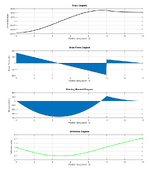justhumm
Structural
- May 2, 2003
- 112
My random thought of the morning...Artificial Intelligence (AI).
If it can't be called so already, is looking like it's going to be a major player in the future of computing across numerous industries.
And I suspect that a large part of the technical aspect of that is going to be created by software companies.
Right now, I'm wondering what structural engineers, themselves, are using AI for in your day to day work...?
generating technical report drafts?
finite element analysis (FEA) input files?
generating code (LISP, VBA, C#, etc.) for repetitive tasks?
creating pictures of your pets playing poker?
Cheers!
Deep Dream Generator

If it can't be called so already, is looking like it's going to be a major player in the future of computing across numerous industries.
And I suspect that a large part of the technical aspect of that is going to be created by software companies.
Right now, I'm wondering what structural engineers, themselves, are using AI for in your day to day work...?
generating technical report drafts?
finite element analysis (FEA) input files?
generating code (LISP, VBA, C#, etc.) for repetitive tasks?
creating pictures of your pets playing poker?
Cheers!
Deep Dream Generator


